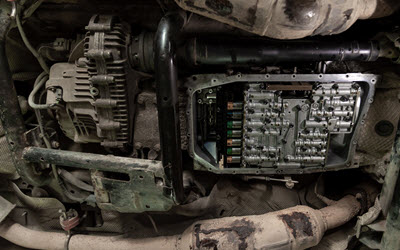How-To Identify Porsche Transmission Valve Body Problems
By Bavarian Performance Specialists September 29, 2025
Diagnosing a transmission valve body problem in a Porsche requires careful attention to your vehicle’s performance, as the valve body is the brain of the automatic transmission that controls the gear shifts through a complex network of channels, solenoids, and valves.
When this component begins to fail, it can disrupt the hydraulic fluid pressure needed for smooth and precise gear changes, which leads to driving issues. Recognizing the early warning signs, such as delayed shifting, gear slippage, and unusual noises, can be crucial for preventing costly transmission damage.
Causes of Porsche Transmission Valve Body Failure
- Contaminated Transmission Fluid: Over time, the transmission fluid can accumulate debris, metal shavings, and dirt. This dirty fluid can clog the passages and scratch the precision-machined valves within the valve body, leading to poor function.
- Overheating: Those Porsches that are driven aggressively or subjected to hot climates can experience high transmission fluid So, excessive heat can cause the seals and gaskets in the valve body to wear out and warp, which can affect the tight tolerances of internal components and cause valves to stick or fail.
- Electronic Issues: Modern Porsche transmissions rely on electronic controls to operate the valve body solenoids. Faulty solenoids, damaged wiring harnesses, or a failing control module can prevent the valve body from receiving the correct commands, causing shifting problems.
- Normal Wear and Tear: The internal components of the valve body, including valves and seals, will wear out over time due to mechanical stress and repetitive low fluid. Many valve bodies begin to show signs of wear around 80,000 to 120,000 miles, and with aggressive driving, this timeframe can be shortened.
- Lack of Maintenance: Skipping regular transmission service, including fluid and filter changes, is the primary reason for valve body failure. So, regular maintenance is important for flushing out contaminants and ensuring the fluid retains its lubricating and cooling properties.
Symptoms of a Failing Porsche Transmission Valve Body
- Delayed Shifting: This is one of the most common signs, where the vehicle jerks when shifting gears and when shifting from park to drive or reverse.
- Gear Slippage: The transmission can slip in and out of gear while driving. This happens when the valve body cannot maintain the correct hydraulic pressure to keep a gear engaged.
- Sluggish Acceleration: A failing valve body can prevent the transmission from shifting properly, leading to a lack of power and a sluggish feeling when accelerating.
- Shift Flares: If the engine’s RPMs suddenly spike between gear shifts instead of dropping, then it is a key indicator of a hydraulic pressure problem within the valve body.
- Unusual Noises: Listen for any knocking, clicking, or whining sounds coming from the transmission, which can become more apparent when shifting gears, slowing down, or reversing.
- Warning Lights: A bad valve body can trigger the check engine or transmission warning light on the dashboard. A failing solenoid or sensor will store a fault code in the vehicle’s computer.
- Transmission Fluid Leaks: Leaks can lead to low fluid levels that can cause low hydraulic pressure and shifting problems.
Solutions For a Failing Valve Body
- Cleaning and Reconditioning: If the problem is caused by dirty fluid clogging, then a thorough cleaning can resolve this issue. The transmission pan is dropped, the valve body is disassembled, and all components are cleaned. The transmission filter and fluid are then replaced.
- Selective Component Replacement: The individual faulty components, such as solenoids, pressure switch, or valve, are replaced. It can reduce the costs compared to a full replacement. This is a targeted repair rather than a full valve body replacement.
- Full Valve Body Replacement: The entire valve body assembly is replaced with a new unit. This is recommended if the valve body has suffered extensive wear due to prolonged contamination or overheating. This guarantees the longevity and performance of the transmission by replacing the dedicated parts in a single comprehensive repair.
- Full Transmission Overhaul: This involves completely rebuilding the transmission, which is necessary when valve body problems are ignored for too long. It is the most expensive option, restoring the entire transmission to its new condition.
Bavarian Performance Specialists: Your Solution for Porsche Transmission Valve Body Problems
Addressing a failing transmission valve body in a Porsche is crucial for  preventing more severe damage. Early detection signs include delayed shifting, gear slippage, or unusual noises. So, a proactive approach, whether through cleaning or replacement, ensures the vehicle’s longevity and performance. Porsche owners can seek expert diagnosis and repair for transmission concerns at Bavarian Performance Specialists, located in Thousand Oaks, CA.
preventing more severe damage. Early detection signs include delayed shifting, gear slippage, or unusual noises. So, a proactive approach, whether through cleaning or replacement, ensures the vehicle’s longevity and performance. Porsche owners can seek expert diagnosis and repair for transmission concerns at Bavarian Performance Specialists, located in Thousand Oaks, CA.
Our certified technicians have experience with the complex transmission systems in Porsche vehicles and are equipped to perform everything from a thorough cleaning to a full valve body replacement. We are committed to honest and quality service, offering a more affordable alternative for all your maintenance and repair needs. By choosing our specialists, you can be confident that your Porsche will receive the expert care it needs to return to the road, performing like new.





